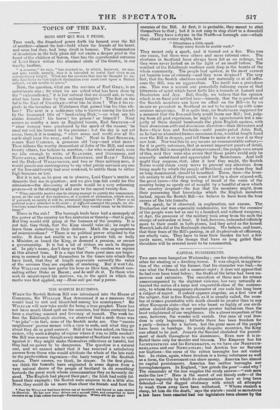TOPICS OF THE DAY.
HONI SOIT QUI MAL Y PENSE.
THIS week, the Standard pours forth his lament over the fall of another—almost the last—hold where the friends of his heart,
and none but they, had long dwelt in honour. The abomination of desolation in the holy place did not excite a deeper grief in the heart of the children of Salem, than has the apprehended entrance of Lord GREY within the charmed circle of the Garter, in our worthy brother.
" A rumour," he says, "has reached us, to which, however, we can- not give credit, namely, that it is intended to instal Earl Grey as an
extraordinary knight. What are the services that can be thought to en- title Earl Grey to this highest distinction ever conferred upon a British subject, we are unable to guess."
Now, the question, what are the services of Earl GREY, is an unfortunate one ; for when we are asked what has been done by the " extraordinary," it is but natural that we should ask, in turn, what has been done by the ordinary knights ? The first on the list is the Earl of CHATHAM—what has he done ? Was it his ex- ploits in the trenches at Walcheren that gained him his blue rib- bon ? The next is a nobleman who is known among his friends by the honoured title of "hard-riding Dick,"—on what are his claims founded ? his horse ? his groom ? or himself? Next comes as worthy a man as England boasts, Earl SPENCER—if " clear honour were purchased by the merit of the wearer," he need not veil his bonnet in the presence : but the day is not yet come, thouoh it is coming, " when sense and worth o'er all the earth shall bear the sway, and a' that." Next to Earl SPENCER, comes Earl CAMDEN, a generous old Tory—and what more ?
Then follows the worthy descendant of John of the Hill, and some twenty others, too tedious to mention,—for who would read, were we idle enough to write, of BEAUFORT, and MONTROSE, and NEWCASTLE, and EXETER, and BATHURST, and BATH? Taking out the Duke of WELLINGTON, and two or three military men, it
would Puzzle our contemporary to say what public services any one of the five.and-twenty had ever rendered, to entitle them to either high honours or low.
But it is not, as he goes on to observe, Lord GREY'S merits or demerits that are in question ; and we give him full credit for this admission—the discussing of merits would be a very reforming process—it is the attempt to add one to the sacred twenty-five.
" What possible motive can be strong enough to justify the commence- ment, at the end of five centuries, of a system of extension, which must, if pursued, as surely it will be, eventually degrade the order ? There is no political pcwer attached to the order ; if diffused amongst the people, its dis- tinctions would become worthless, because they would cease to be distinc- tions."
There is the rub ! The borough lords have had a monopoly of the power of the country for five centuries or thereby—that is gone. But they would still grasp at the honours of the country. It is
not fair, they think, that the King should take all; he ought to leave them something in their distress. Mark the argumentum ad misericordianz! "There is no political power attached to the order. It does not enable us to pass a private bill, or bully a Minister, or beard the King, or demand a pension, or secure a governorship. It is but a bit of ribbon we seek to dispose cf. In pity's name, don't deny us that." We confess we rejoice at this altered tone. It is a sign that these great men are begin- ning in earnest to adapt themselves to the times into which they have lived, that they at length appreciate correctly the value of the services they are capable of rendering. But it won't do. Our WILLIAM can now garter his hose as likes him, without con- sulting either Duke or Baron ; and he will do it. To those who seek to misinterpret his motives, we, in the spirit in which the motto was first applied, say—Honi soil qui mal y pense.


























 Previous page
Previous page